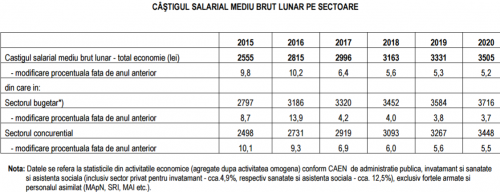 The Government will not send anymore the Parliament a new draft law for the unitary salary in the public system – it will be soon completed, but not be launched for public debate, as the officials previously announced.
The Government will not send anymore the Parliament a new draft law for the unitary salary in the public system – it will be soon completed, but not be launched for public debate, as the officials previously announced.
The project will be left to the next government, told cursdeguvernare.ro Bogdan Hossu, chairman of cartel Alfa confederation after the meeting of the Tripartite Council, on Monday.
It requires an allocation of 19.5 billion lei (EUR4.33 billion) by 2022 to resolve all salary inequities in the public system, according to the Government’s calculations.
Rewriting the unitary salary law was one of the technocrat government’s priorities and led to the first departure from the Ciolos Cabinet: Claudia-Ana Costea resigned because of a draft emergency ordinance that she did not agree.
New details about the project:
- average increase of the salary paid from the public funds will be of 37.3%, correlated with the forecasted economic growth
- ratio between the minimum and maximum salary will be reduced to 1/13
- the highest salary will be paid to the president and prime minister’s current salary will be reduced by 300 lei
- they will be awarded bonuses for functions difficult to cover (30%), such as doctors and IT professionals, to compensate for situations where recruitment is difficult
- performance increases up to 5% of the budget.
Minister Pislaru last week: In two weeks, we send the draft to the Parliament
The average national gross salary will reach 4,000 lei by 2021, according to the statements of minister of Labour, Dragos Pislaru, on the Law on unitary pay in the public sector, a draft that the Dacian Ciolos Government is willing to complete in early December.
„We propose a unitary salary law that can be applied. In two weeks, we shall have the draft law, in early December we submit the law,” the minister said on Monday for Antena 3.
At present, Dragos Pislaru explained, there are 5.6 million employees in Romania, of which 1.217 million are working in the state system.
„The average gross salary (national salary – editor’s note) sill be around 4,000 lei in 2021; 4,000 lei from 2,800 lei, as it is today,” said Minister Pislaru.
This means that state employees will have an average gross salary of more than 4,000 lei, as the average earnings in this sector are higher than in the private sector : the difference between the public sector and the sector based on competition is 455 lei in 2016 and will be reduced to 268 lei 2020, according to the National Prognosis Commission (CNP).

*
- Monthly average gross salary by economic sectors
- Monthly average gross salary – total economy (lei)
- – change compared to previous year
- of which:
- Budgetary sector *)
- – change compared to previous year
- Sector based on competition
- – change compared to previous year
Note: The date refers to the statistics related to the economic sectors (aggregated by homogenous activity) according to CAEN of public administration, education, healthcare and social assistance (including the private education sector – about 4.9%, respectively healthcare and social assistance – about 12.5%), excluding armed forces and similar (The Ministry of National Defence, The Ministry of Internal Affairs, The Romanian Intelligence Service, etc.).
*
According to CNP, the average national gross salary is estimated to 3,505 lei for 2020, which means that the Minister of Labour is very optimistic and predicts either an increase rate higher in this interval of time or a consistent salary increase by 500 lei in 2021.
The ordinance on unitary pay – compromised by the salary increases related to elections
The deadline for completion of the law was initially set by the Ciolos Government in February 2016.
Instead of the law, which could not be sustained financially in any variant, the Government chose an emergency ordinance to make some adjustments within the wage range available. The Emergency Ordinance 20 has been extensively amended, however, by the Chamber of Deputies on November 7.
The law for adopting the ordinance was passed after an exchange between the Minister of Labour Dragos Pislaru and the PSD leader – Liviu Dragnea.
Pislaru urged lawmakers to leave the Ordinance of Emergency 20 as it was, pointing out that the committees’ report contained increases that were not even in the public discussions.
The Government’s draft, unlike the committees’ report, is sustainable and comes with a 30% increase in five years, the minister also said:
„This is the money of people from this country, we sell them this illusion illegal to be promoted in the run up to the elections.
I appeal to your understanding and responsibility to not fool the people from the country and preserve the dignity of your position and understand that the only way that we can implement a salary policy is to make calculations, ee what we can afford, not hurry and implement something that makes sense for 5 years so that everyone has something to gain.”
Dragos Pislaru explained that the changes polarize further the salary in the state sector: „The report will increase the salaries of those who already have higher salaries and do less for those who are new in the system and whom we want to keep in the country: pharmacists, doctors, nurses or teachers, professors.
It is not normal to have increases of over 50% for senior management, given that our problem is the teacher from the rural area„.
The impact of the law is of 4.8 billion lei, according to the Government’s calculations, compared to 2.6 billion in the initial form of the Emergency Ordinance 20.
In response, Liviu Dragnea accused the Government that it has enough money for the salary increases decided by the specialized committees of the Chamber of Deputies, arguing that the lack of funds is „a big lie” and the deficit would not be in danger.
„The Parliament cannot be stopped to adopt laws. Nowhere in the world a parliament can be stopped to legislate,” said the social-democrat leader.
He argues that OUG 20/2016 „induced disorder in the system” and according to the official data, 29 billion lei would remain unspent this year.
„If someone from the Ministry of Finance wants to contradict me, I expect them at any time. (…) They have 29 billion unspent once they took their country back,” said Dragnea.
The law will go for promulgation, but several ministers have already announced that it will be challenged on the CCR, the main arguments being that is does not comply with two provisions:
- does not provide the source of funding
- violates art. 17 paragraph (1) of the Fiscal Responsibility Law no. 69/2010, which provides that „acts leading to increased staff costs cannot be adopted within less than 180 days before the Government’s mandate ends, in accordance with art. 110 paragraph (1) of the Constitution of Romania, republished”
Corrections applied by the Government abolished by the Parliament. New inequities introduced instead
The principles that should have been observed from 2010 onwards
The Law no 284/2010 on the unitary salary in the public sector introduced the first coherent wage grids, established after consultations with trade unions and experts from the World Bank.
The regulation provided for a period of six years for each payroll category to take up the due position in that grid.
In these years, the low paid categories, from the bottom of the grid would have been able to gradually go up until each would have reached, as in a puzzle, the level set according to the 1 to 15 ratio (the highest salary to be at the most 15 times higher than the lowest one).
Uniform increases made by fields, depending on the pressures and election campaigns, led to chaotic progress in various categories and caused new disruptions.









